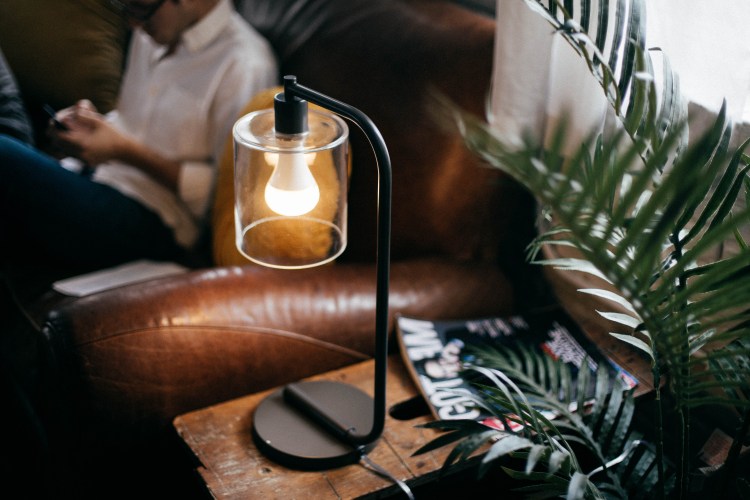Hardware startup Astro thinks that light and sound belong together. Today the company is launching and taking preorders for Twist, a remote-controlled lightbulb with AirPlay-enabled speakers.
Astro’s Twist bulb is very much a smart home device, though it won’t connect to your toaster or to a hub where you can control all your other Wi-Fi-enabled appliances. It doesn’t even have an app. The 10-watt bulb connects to a handheld dial from which you can dim the light and control its temperature (it offers white light, yellow light, and a purple night light); and multiple Twist lights can be synced to one dial. Some of the bulbs are also equipped with wireless AirPlay Tymphany speakers that emit some pretty excellent sound.
Founder Shaun Springer says the product is aimed at people who live in small places, like a 300-square-foot apartment. Instead of buying a giant speaker system, consumers can kill two birds with one stone by distributing a couple of Twist speaker-bulbs around the house and having sound everywhere — even in the bathroom.
The product is cool, but during the demo yesterday, I couldn’t help but think, No one knows they need Frankenstein speaker-bulbs. Though Springer makes a solid case for light bulbs with good quality speakers, the product doesn’t solve a consumer problem — or at least a problem that consumers are aware of.
That is the same problem that plagues much of the rest of the smart home market.
Though smart home devices are appliances that are supposed to make your life easier, with lights that are programmed to turn on when you get home or a thermostat that you can control from anywhere, Internet-enabled home devices haven’t quite taken off with consumers.
Major companies have invested significant resources into developing the future home space. Last year, Apple announced its bid for the smart home with a platform for connected devices and apps called Home. More recently Google unveiled its Brillo operating system to help smart devices connect to its Android platform. Already Google has acquired connected home devices like home surveillance camera Dropcam and smart thermostat Nest.
While the promise of a connected home is great, it might be more of a fantasy than a reality for consumers. Early adopters of smart home networks have found them confusing and difficult to manage.
“It is obvious that the early adopters have bought what they want, and other consumers are expressing frustration that these products are complicated and difficult to set up and use,” said Argus Insights CEO John Feland in a report on connected devices. As a result of some of these hurdles, he wrote, consumers are becoming disenchanted with the connected home. His company conducted a recent poll that suggests desire for connected home products has fallen 15 percent from a year ago.
The issues within the connected home market are not lost on Springer. Before starting Astro, Springer worked for Crestron, a large purveyor of connected devices aimed at corporations and wealthy homeowners, where he witnessed firsthand some of the major problems consumers face.
“The technology and the experience and the value proposition are all broken,” he said. That’s why he’s decided to market his initial product as a furnishing, rather than a gadget. When he eventually starts selling Twist in stores, Springer will seek out trendy furniture retailers, rather than home improvement outlets like Home Depot and Lowe’s.
“We try not to identify ourselves as a smart home company,” said Springer.
He says marketing and selling products through these kinds of venues will position Twist as an enhancement to your home instead of an appliance or high-end gadget. It will also help him appeal to what he thinks is an untapped market, apartment dwellers. All too often connected home devices are aimed at homeowners rather than apartment renters and don’t take into account dwellings where people can’t change their home infrastructure.
While the marketing tactic seems right, the product still seems confused.
The initial Twist package, available for sale today, will cost $249 for two smart bulbs without speakers and one with. An additional speaker-bulb can be purchased for $129. The bulbs are supposed to last around 12-15 years.
Most smart bulbs cost anywhere from $6 to $30, so it’s hard to see why consumers would be interested in Twist except perhaps as a novelty. There are already portable speakers aimed at helping young urbanites create an affordable sound system, like the Beats’ Pill and Jawbone’s Jambox, both of which are cheaper than a set of Twist speaker-bulbs.
There’s a possibility for interest from business owners, namely bars, restaurants, and perhaps retail shops that need to pipe in music throughout a large space, but overall it’s hard to see why people would buy this product.
Springer doesn’t really seem concerned with mass adoption just yet. With the product officially launched, he’s hoping to find his first set of early adopters to test, review, and find an audience for the bulbs. Expect Twist to start shipping in 2016.
VentureBeat's mission is to be a digital town square for technical decision-makers to gain knowledge about transformative enterprise technology and transact. Learn More

